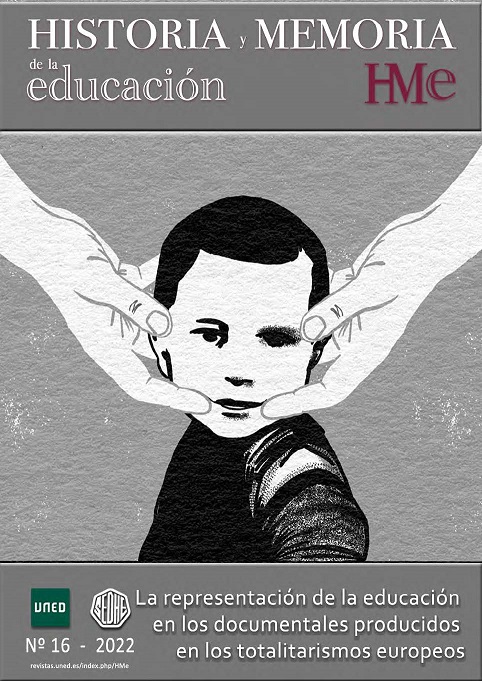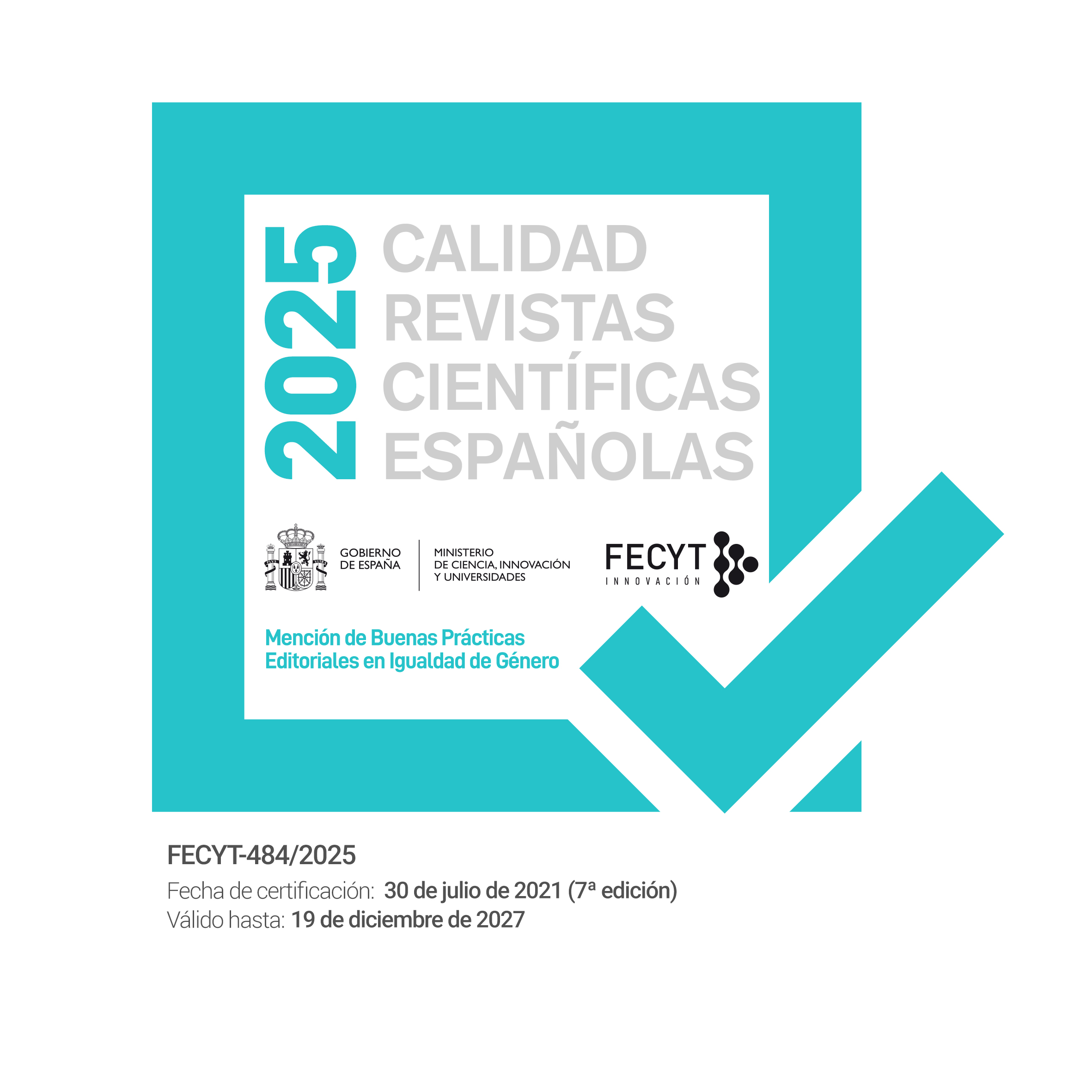The educational memory of documentaries as a confrontation to the totalitarianism past
DOI:
https://doi.org/10.5944/hme.16.2022.32015Keywords:
Newsreels about education, Politics of silences, Dictatorship’s memoriesAbstract
As the result of two research projects about documentaries and newsreels produced in Spain between 1914-1939 and 1939-1970, we discovered different silences and rumours which had an impact un the memory and the history of education. We know that those silences and rumours were applied systematically as part of a national policy, affecting mainly the vulnerable population and stymieing any attempt at changing the situation. It is important that we understand why those silences and rumours persist nowadays and how the history and memory of education confront them. The silences, like the manipulations, make up a part of our past, yet they still have effects today. And this is true not only with Francoism; in different totalitarian systems, as well as during violent historical episodes, there has been a habit of imposing silence. The same thing has occurred withnewsreels and documentaries. Different responses have attempted to address this problem and its effect on the recuperation of educational memories, and it ultimately depends on political, cultural and social contexts. In researching and disseminating one’s own past, the sensation of uneasiness is inherent to the process. The educational memory assumes this apprehension when it is developed as complex history which explains the lived educational experiences that are being related. In this article, we explore some of the premises and the potential of fragile memories and complex stories forming part of an intentional research program around audiovisual sources produced as propaganda in a totalitarian political framework. The different lines of research pursued in the aforementioned projects, but not exclusive to them, reinforced the need to advance in those methodologies that could bring together the different paths connecting the common elements and allowing for the possibility of narrating the silence with the perspective of a social history linked to justice and democracy.
Downloads
References
Aldgate, Anthony. Cinema & History. British Newsreels and the Spanish Civil War. Londres: Scolar Prees, 1979.
Burke, Peter. Eyewitnessing. The Uses of Images as Historical Evidence. Londres: Reaktion Books, 2001.
Carreño, Antonieta; Gloria Díaz y Anna Gómez. «La seducción de lo fácil en educación: una amenaza vital». Rizoma Freiriano, vol. 31 (2021). URL: http://www.rizoma-freireano.org/articles-3131/la-seduccion-de-lo-facil
Carrillo, Isabel. «Pedagogía de la memoria, derecho y bien común», En Totalitarismos europeos, propaganda y educación, Coords. Eulàlia Collelldemont y Conrad Vilanou (Gijón: Trea, 2020), 299-316.
Chapman, James. The British at War. Cinema, State and Propaganda, 1939-1945. Londres: I.B. Tauris, 1998.
Collelldemont, Eulàlia; Núria Padros y Raquel Cercós. «Images That Portray, Challenge, and Refuse: Visual Content and Education in Francoist Spain, 1939–1975». En Appearances Matter. The visual in educacional history, Tim Allender, Inês Dussel, Karin Priem e Ian Grosvenor (Berlín/Boston: Walter de Gruyter, 2021), 63-86.
Duran, Valeriano. «Los niños prodigio del cine español: referentes culturales y educativos de los 60 en sus películas y en el NO-DO». En Disciplinas educativas en regímenes totalitarios. Una historia visual desde documentales, coords. Conrad Vilanou y Eulàlia Collelldemont. (Gijón: Trea, en prensa, previsión 2021)
Dussel, Inés. «La verdad en la imagen propagandística Reflexiones sobre un corpus enigmático (Westerbork, 1944)». Historia y Memoria de la Educación, no. 8 (2018): 23-56. https://doi.org/10.5944/hme.8.2018.20411
Eley, Geoff. « What is Fascism and Where does it come From?». History Workshop Journal, no. 9 (2021): 1-28. https://doi.org/10.1093/hwj/dbab003
Grosvenor, Ian. «No hay poder sin control de la imagen: “en la escuela aprendemos a leer, pero no aprendemos a ver». En Totalitarismos europeos, propaganda y educación, Coords. Eulàlia Collelldemont y Conrad Vilanou (Gijón: Trea, 2021), 21-36.
Joyce, Patrick. Going to my father’s house. A history of my times. Londres: Verso, 2021.
Moraes Battistelli, Bruna y Brasil Érika Cecília Soares Oliveira. «CARTAS: um exercício de cumplicidade subversiva para a escrita acadêmica». Currículo sem Fronteiras, 21, no. 2 (2021): 679-701. http://dx.doi.org/10.35786/1645-1384.v21.n2.12 .
Myers, Kevin e Ian Grosvenor. Collaborative Research: History from Below. Bristol: University of Bristol, 2018. Accesible en: https://connected-communities.org/wp-content/uploads/2018/07/History_From_Below_SP.pdf
Nora, Pierre. (dir.). Les Lieux de mémoire. París: Gallimard, 1984-1992.
Porton, Richard. Cine y Anarquismo. La utopía anarquista en imágenes. Barcelona: Gedisa, 2001.
Radden Keefe, Patrick. No digas Nada. Una historia real de crimen y memoria en Irlanda del Norte. Barcelona: Reservoir Books – Penguim Random House, 2020.
Ramos do Ó, Jorge. O governo de si mesmo. Modernidade pedagógica e encenações disciplinares do aluno liceal (último quartel do século xix – meados do século xx). Lisboa: Educa, 2003.
Rousmaniere, Kate. «Nostalgia and educational history: An American image». Paedagogica Historica 53, no. 6 (2017): 697-706.
Sánchez, Ferran y Isabel Vilafranca. «De la redención moral a la redención de penas por el trabajo: oteando las vías reeducativas en los centros penitenciarios del régimen franquista». En Disciplinas educativas en regímenes totalitarios. Una historia visual desde documentales, coords. Conrad Vilanou y Eulàlia Collelldemont (Gijón: Trea, en prensa, previsión 2021)
Soler, Judit y Eulàlia Collelldemont. «Els relats de la història com a motiu de conversa educativa». Quaderns d’educació contínua, no. 45 (2021): 15-20.
Thanh Nguyen, Viet. «Just Memory: War and the Ethics of Remembrance». American Literary History 25, no. 1 (2013): 144–163. https://doi.org/10.1093/alh/ajs069.
Thanh Nguyen, Viet. The Refugees. Nueva York: Grove Atlantic, Inc., 2017.
Viñao, Antonio. «La educación escolar». En Totalitarismos europeos, propaganda y educación, Coords. Eulàlia Collelldemont y Conrad Vilanou (Gijón: Trea, 2021), 59-79.
Weber, Stephanie y Matthias Mühling (eds.) After the Fact. Propaganda in the 21st Century. München: Städistische Galerie im Lenbachhaus und Kunstbau München, 2017.
Zambrano, María. Claros del Bosque. Madrid: Alianza Editorial, 1977.
Downloads
Published
How to Cite
Issue
Section
License
Copyright (c) 2022 Historia y Memoria de la Educación

This work is licensed under a Creative Commons Attribution-NonCommercial 4.0 International License.
Authors who publish in Historia y Memoria de la Educación agree to the following terms:
- Authors retain copyright and grant the journal right of first publication with the work simultaneously licensed under a Creative Commons Attribution-NonCommercial 4.0 International that allows others to share the work with an acknowledgement of the work's authorship and initial publication in this journal.
- Authors are able to enter into separate, additional contractual arrangements for the non-exclusive distribution of the journal's published version of the work (e.g., post it to an institutional repository or publish it in a book), with an acknowledgement of its initial publication in this journal.
- Authors are permitted and encouraged to post their work online (e.g., in institutional repositories or on their website) prior to and during the submission process, as it can lead to productive exchanges, as well as earlier and greater citation of published work (See The Effect of Open Access).












